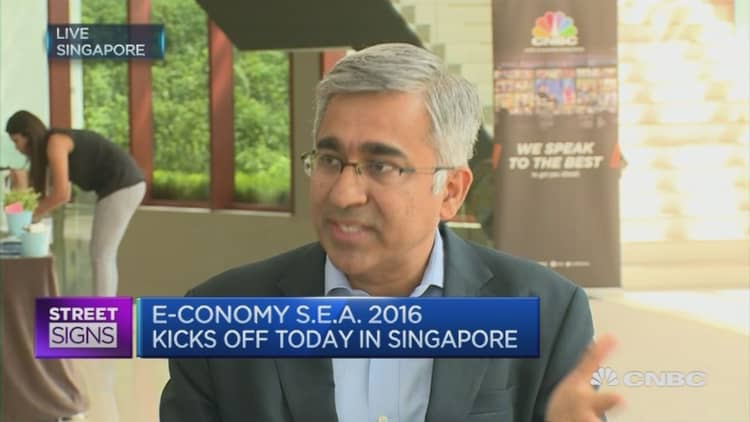


To be a successful player in southeast Asia's burgeoning internet economy, companies need to have an international outlook in dealing with people, employees and entrepreneurs from outside their home countries, according to Joseph Tsai, executive vice chairman at Alibaba Group.
His company's runaway success in capturing one of the largest e-commerce markets in the world was generally considered a model for other entrepreneurs to follow. But Tsai said Alibaba's experience in China was different from what companies faced in southeast Asia.
"From an internet standpoint, China is a unified market of 1.3 billion people," Tsai told investors, venture capitalists, e-tailers and start-ups at the e-conomy SEA 2016 conference in Singapore. The southeast Asian market, while lucrative, was divided by language, culture and geography — which placed additional challenges on logistics.
Southeast Asia's potential was highlighted by a joint study released Tuesday by Google and the Singapore government's investment arm, Temasek Holdings. The study said that southeast Asia's internet economy was expected to grow to $200 billion by 2025, primarily driven by growth in e-commerce.
According to Tsai, many countries in the region, such as Indonesia, were about to reach a level of growth where discretionary consumer spending would take off.
He added that in China, Alibaba's growth picked up pace after discretionary spending in the economy rose. "Between 2009 to 2010, the Taobao marketplace added about $50 billion in gross merchandise value," Tsai said.
While the potential for e-commerce was evident in southeast Asia, Nick Nash, group president at Singapore-based internet company Garena, said most online transactions in the region were currently informal, taking place in "the electronic version of wet markets" such as online blog shops and with sellers on Instagram.
Added to that was the fact that 97 percent of potential buyers weren't even online yet.
As a result, the region's online retail market contributed just a fraction of the total global market; a Bain & Company study released in March found online retail represented just 3 percent of the total retail market in Southeast Asia. This was compared to a roughly 14 percent contribution to global e-commerce each from China and the U.S., according to the study.
The numbers reflect the fact that e-commerce is a "winner take all" market, where size matters. Nash cited China, where online transactions are dominated by just four players - Baidu, Alibaba, Alibaba affiliate Ant Financial, and Tencent - as an example.
"When it comes to internet platform business models, there is a winner take all, winner take most dynamic," he said. "A similar dynamic will transpire here in Southeast Asia," he added.
One local business that is making headway in this growing market is Singapore-based online retailer Lazada Founded just four years ago, Lazada acts as a sales platform for sellers to reach potential buyers in Indonesia, Malaysia, the Philippines, Singapore, Thailand and Vietnam.
"We see the complexity that brands and global merchants have in entering southeast Asia because...it's smaller, fragmented markets," Maximillian Bittner, chief executive officer at Lazada, told CNBC. "Our position as a one-stop shop, and allowing these brands to enter the region, has a uniqueness about it."
In April, Alibaba invested $1 billion in the company to take advantage of Lazada's established supply chain, delivery and payment options, in order tap into the Southeast Asian market.
Tsai said the investment was part of Alibaba's efforts to globalize, instead of only relying on the huge domestic market.
"Globalization doesn't mean only setting up operations outside of your home country," he said. "It means a change in mentality in terms of how you deal with people, employees and entrepreneurs from outside your home countries."
Bittner said he expected more changes to occur in the e-commerce space in southeast Asia in the next four to five years, particularly in the areas of payments and regional trade due to the Trans-Pacific Partnership that is currently being ratified by the signatories. "The change will come left, right and center."
Alibaba is not alone in seeing the potential in the region.
Rohit Sipahimalani, co-head of portfolio and strategy at Temasek International, the Singaporean investment giant said he saw an increasing flow of capital into the online retail sector.
Sipahimalani said Temasek identified two to three years ago that there was insufficient funding for companies in their early stages of growth, due to the lack of venture capital funds in the region. So Temasek, which itself is a late-stage investor, seeded four venture capital funds in the region, that raised several hundred million dollars to invest in start-ups.
"That helped kickstart the ecosystem to Series A and B [funding]." he said.




